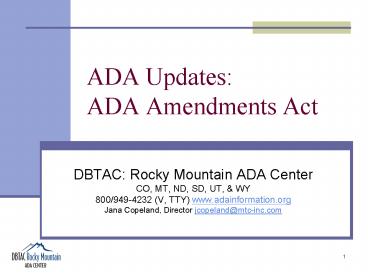ADA Updates: ADA Amendments Act - PowerPoint PPT Presentation
1 / 21
Title:
ADA Updates: ADA Amendments Act
Description:
Information, materials, and/or technical assistance are intended solely as ... ADA modeled after the Rehabilitation Act of 1973 ... – PowerPoint PPT presentation
Number of Views:130
Avg rating:3.0/5.0
Title: ADA Updates: ADA Amendments Act
1
ADA UpdatesADA Amendments Act
- DBTAC Rocky Mountain ADA Center
- CO, MT, ND, SD, UT, WY
- 800/949-4232 (V, TTY) www.adainformation.org
- Jana Copeland, Director jcopeland_at_mtc-inc.com
2
Disclaimer
- Information, materials, and/or technical
assistance are intended solely as informal
guidance, and are neither a determination of your
legal rights or responsibilities under the ADA,
nor binding on any agency with enforcement
responsibility under the ADA. - DBTAC Center authorized by NIDRR to provide
information, materials, and technical assistance
to individuals and entities that are covered by
the ADA.
3
So I heard the ADA is new and different
- A Brief Overview of the ADA Amendments Act of 2008
4
A Little Background
- ADA modeled after the Rehabilitation Act of 1973
- In 1999, Supreme Court started to narrow the
definition of disability in unexpected ways - Resulted in more restrictive view of who was
protected under the ADA - Hence, Congress belief that the law needed
amended
5
Purpose of the ADAAA
- Clarifies the definition of disability by
rejecting holdings in several Supreme Court
decisions and portions of EEOCs ADA regulations - Clarifies Congressional intent to protect civil
rights of individuals with disabilities - Charges EEOC with revising ADA regulations
revising definition of substantially limits
6
Major Elements of ADAAA
- Definition of disability
- Major life activities
- Episodic conditions
- Mitigating measures
- Substantially limits
- Regarded as prong
- New regulations required
7
Definition of Disability
- Broad coverage to maximum extent permitted
- Defines disability as
- Physical or mental impairment that substantially
limits one or more major life activity - Record of impairment which substantially limits
- Regarded by others as having
8
Major Life Activities
- Expands definition by providing non-exhaustive
list - Caring for oneself, performing manual tasks,
seeing, hearing, eating, sleeping, walking,
standing, lifting, bending, speaking, breathing,
learning, reading, concentrating, thinking,
communicating, and working - Operation of major bodily functions (e.g., immune
system, digestion, circulation, respiration,
reproduction) - Impairment limiting one activity need not limit
other activities to establish disability
9
Episodic Conditions
- Impairments that are episodic or in remission are
considered disabilities - If impairment would substantially limit a major
life activity when in active state - Examples seizure disorders, cancer, multiple
sclerosis
10
Mitigating Measures
- Effects of mitigating measures not considered in
determining impairment - Examples medication, medical supplies, mobility
devices, prosthetics, hearing aids, oxygen - Includes use of assistive technology, auxiliary
aids and services, learned behavioral or adaptive
neurological modifications - Exception ordinary eyeglasses or contacts
11
Substantially Limits
- EEOC Supreme Court incorrectly interpreted term
to establish greater degree of limitation than
Congress intended - Intent to interpret consistently with finding and
purposes of the ADAAA - No definition offered in the statute look to
regulations
12
Regarded As
- Coverage if subjected to discrimination based on
actual or perceived impairment - Regardless if impairment limits major life
activity - Transitory and minor conditions excluded
- Employers and other covered entities not required
to provide accommodations
13
Miscellaneous Provisions
- Employers and other covered entities must allow
individuals to complete tests and exams using
vision correction devices - No alteration to state Work Comp laws or
eligibility for other Federal disability benefit
programs - No reverse discrimination protection
- Covered entities can still deny reasonable
accommodation/modification if it results in a
fundamental alteration
14
Key Dates
- Goes into effect January 1, 2009
- Still awaiting EEOC regulations
- Other Federal agencies also have regulatory
responsibilities (e.g., DOJ, DOT) - Claims pre/post ADAAA?
15
Implications for Workforce Professionals
- So what does it mean for you?
16
Keep in Mind
- Covered entities who are complying with the law
dont have anything to worry about - Beneficial for both covered entities and
employees - Most covered entities wont feel significant
financial or administrative impact - Expansion vs. restoration
17
Recommendations
- Dont panic!
- Read up on the changes
- Provide training
- Marketing opportunity for the DPN program
- Targeted at One Stop staff, employers, community
partners, job seekers with disabilities - Include disability etiquette
18
Accommodations
- Returns service providers to the intent of the
law and shifts focus back to the interactive
process - Review existing policies and processes
- Update handbooks, policies, and signage
- Time freed up from extensive documentation
process for customers needing accommodation
19
Resources
- ADA Amendments Act http//frwebgate.access.gpo.gov
/cgi-bin/getdoc.cgi?dbname110_cong_billsdocidf
s3406enr.txt.pdf - EEOC ADAAA Notice http//www.eeoc.gov/ada/amendmen
ts_notice.html - Disability Law Lowdown ADAAA Episode
http//dll.ada-podcasts.com/shownotes/DLLPod18.php
- DBTAC Webcast Episode Archive http//www.ilru.org/
html/training/webcasts/archive/2008/11-19-AM.html
- ADA Legal Webinar Archive http//www.onlineconfere
ncingsystems.com/sedbtac_1/102808/ - American Association of People with Disabilities
ADAAA Site http//aapd.com/AAPDRedesign/Advocacy/L
egislativePrioritiesfront.html - Georgetown Universitys ADA Archive
http//www.law.georgetown.edu/archiveada/
20
Question and Answer Session
- Open lines for Discussion
- If you have a question or comment click on the
raise hand icon on the right hand side toolbar.
We will then un-mute your line. - You can also submit your question or comment in
writing using the QA function on the toolbar.
Please be sure to send it to either the host or
the panelist. We will then read your question.
21
More Questions?
Jana Copeland, PhDDBTAC Rocky Mountain ADA
Center3630 Sinton Road, Suite 103Colorado
Springs, CO 80907800-949-4232 719/444-0268, ext.
109 719/444-0269 (fax) jcopeland_at_mtc-inc.com www.
adainformation.org































